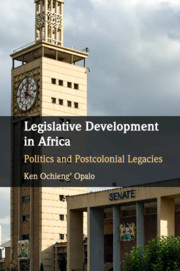Book contents
- Frontmatter
- Dedication
- Contents
- List of Figures
- List of Tables
- Preface
- Acknowledgements
- 1 Introduction
- 2 Legislative Development in Africa
- 3 Intra-Elite Politics and Credible Commitment
- 4 Colonial Origins of Parliaments in Kenya and Zambia
- 5 Elite Control and Legislative Development
- 6 Legislative Institutionalization in Time
- 7 Electoral Politics and Legislative Independence
- 8 Conclusion
- References
- Index
5 - Elite Control and Legislative Development
Published online by Cambridge University Press: 17 June 2019
- Frontmatter
- Dedication
- Contents
- List of Figures
- List of Tables
- Preface
- Acknowledgements
- 1 Introduction
- 2 Legislative Development in Africa
- 3 Intra-Elite Politics and Credible Commitment
- 4 Colonial Origins of Parliaments in Kenya and Zambia
- 5 Elite Control and Legislative Development
- 6 Legislative Institutionalization in Time
- 7 Electoral Politics and Legislative Independence
- 8 Conclusion
- References
- Index
Summary
A claim in this book is that intra-elite politics condition the nature of executive-legislative relations. In particular, that presidents’ strategies of elite control determine the levels of legislative organizational independence. This chapter examines the specific strategies of elite control deployed by presidents in postcolonial Kenya and Zambia and their effects on legislative development in the two countries. I show how contingencies of the decolonization process predisposed Kenyan presidents to rely more on administration-based control of fellow elites’ political activities. In Zambia, the decolonization process bequeathed the country with party-based means of elite control. I also argue that, compared to party-based control, administration-based control resulted in a more dependable principal-agent relationship between the president and officials in the periphery. This is because unlike party officials, administration officials were less amenable to capture by politicians. Confident in their ability to monitor and balance fellow elites, Kenyan presidents granted their legislatures a modicum of organizational independence. In Zambia, the fear of agency loss forced the president to limit legislative independence, and instead rely on the party that was easier to control. In this manner, differences in strategies of elite control resulted in differences in legislative organizational development in Kenya and Zambia.
Information
- Type
- Chapter
- Information
- Legislative Development in AfricaPolitics and Postcolonial Legacies, pp. 132 - 178Publisher: Cambridge University PressPrint publication year: 2019
